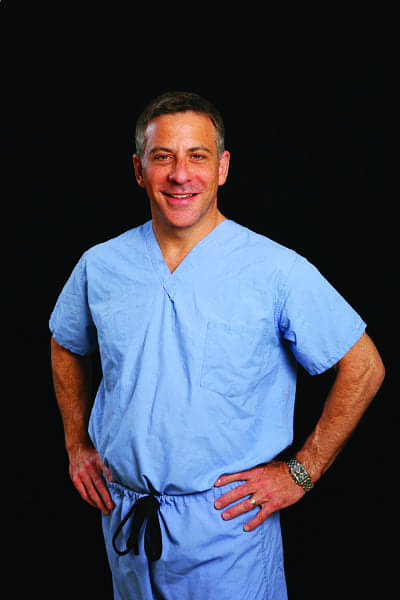Chicagoland plastic surgeon Michael A. Epstein, MD, is a drummer, a tennis player, and an avid Michigan football fan, but his favorite place to be is the OR.
Epstein received his undergraduate degree from the University of Michigan and his medical degree from Wayne State University in Detroit. He trained in general surgery at the Michael Reese Hospital in Chicago and returned to Detroit for his plastic surgery fellowship. Dr Epstein received additional cosmetic surgery training at the Manhattan Eye, Ear and Throat Hospital in New York and has held an academic position in the University of Chicago’s Department of Plastic Surgery.
Plastic Surgery Practice sat down with Epstein to talk about how it feels to be compared to Dr McDreamy from the hit TV series Grey’s Anatomy, his practice philosophy, and the growing popularity of postbariatric body contouring.
1 How big a role does body ?contouring play in your practice? Is it growing?
Body contouring makes up about one-fourth to one-third of cases and revenue that my practice generates. Interestingly, liposuction by itself is trending downward slowly, but abdominoplasty, body lift, thigh lift, arm lift, and mommy makeover (body contouring with breast enhancement surgery) are all increasing in ?numbers in my practice. One of the main factors driving the increase in post-massive-weight-loss body contouring is the evolution of bariatric surgeries. Procedures such as gastric sleeve are leading to more body contouring cases for me.
2 What do you feel is the biggest advance in this area of plastic surgery?
Less undermining and more liposuction (as a part of body contouring procedures). This, combined with barbed sutures for tighter closures, has allowed us to omit drain tubes and achieve better external incisional scars as a result.
3 Do you feel that body ?contouring has psychological benefits?
We can’t take a psychologically ill person and cure him or her with surgery, but yes, we can help many patients that have specific hang-ups about certain body parts. Body contouring procedures can often help the depression or obsession that can be related to their specific physical problem. This, in turn, may allow a person to become more active and live a fuller lifestyle. And it’s not just body contouring; I think that many cosmetic surgeries have psychological benefits, whether it is body contouring, reshaping a nose that one is self-conscious about, or rejuvenating a face so that one does not appear tired or angry.
4 What makes body contouring patients unique?
Most people who want plastic surgery are basically healthy, but patients who are presently or were formerly morbidly obese often have medical problems associated with the obesity. They are also at higher risk for deep vein thrombosis and can have more problems healing. As a result, we have to make sure they’re medically fit to withstand some of these operations, and emotionally prepared for the possibility of a longer or complicated recovery process.
5 Which other procedures are “popping,” and why?
In my practice, the two procedures experiencing the largest growth over the last several years are facelift and rhinoplasty. I suspect this is largely due to word-of-mouth. Together, they make up one-third of my surgical caseload. In the industry as a whole, breast augmentation is still the No 1 surgical procedure performed in the US, but the procedures experiencing the most growth are male calf implants and gynecomastia reduction, even though they are still lower in overall numbers.
6 Michelle Obama’s arms sired a rise in arm lifts. Have we seen other celebrity-driven trends?
Celebrities in general promote cosmetic surgery. The more the public sees that people are having and talking about their cosmetic procedures, the more they are becoming an accepted way of life.
7 What is your practice ?philosophy?
I want to understand my patients’ desires and goals as well as health and lifestyle status, and they need to understand their diagnosis and options for treatment. It’s a two-way street. I’m also a big believer in hiring only the best staff. Much of my success comes down to the outstanding people around me. Lastly, I am a stickler for details, from what my staff says to patients to the consultation process, my photographs, markings, and, of course, my surgical technique and postop care.
8 How do you feel about being compared to Dr McDreamy, from the hit TV series Grey’s Anatomy, by the Chicago Tribune?
It was a big kick at the time, but that was a while ago now. As you might imagine, I have a love-hate relationship with the aging process.
9 Tell us something we don’t know about you.
I have been happily married for 28 years, and I’m still crazy about my wife. I am a huge Detroit Tigers fan and a Michigan football nut. Right now, the Wolverines are driving me a little crazy. Michigan football is like my patient care. I expect nothing less than excellence.
10 Where do you get your industry news?
The Aesthetic Surgery Journal, and, of course, Plastic Surgery Practice.
William Payton is a contributing writer for Plastic Surgery Practice magazine. He can be reached via [email protected].



